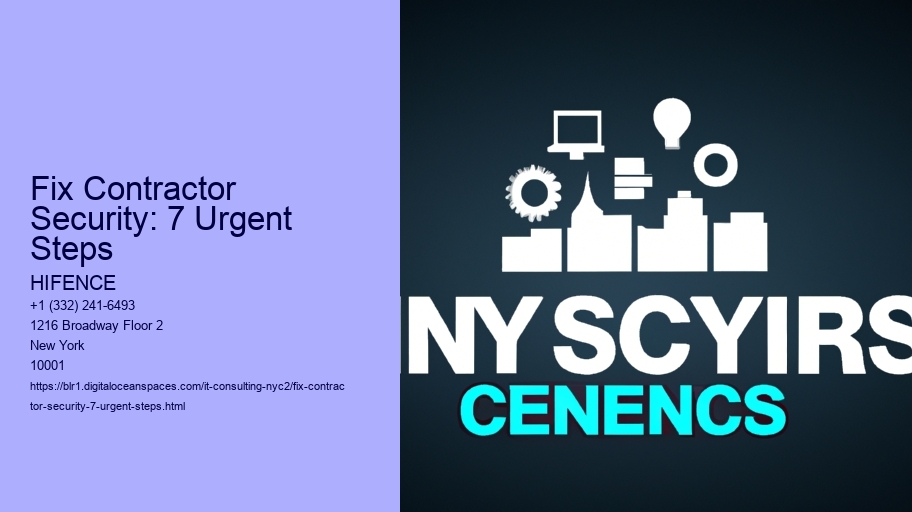Fixing Contractor Security: 7 Urgent Steps
Okay, lets talk about something that keeps a lot of business owners up at night: contractor security! Youve brought in outside help, which is fantastic for getting things done, but it also means opening up your digital doors to… well, strangers. managed it security services provider And sometimes, those strangers arent as careful as youd like them to be. Thats why getting contractor security right is absolutely essential. Its not just a "nice-to-have," its a "must-do-or-risk-losing-everything" kind of thing.
So, how do we tackle this beast?
Fix Contractor Security: 7 Urgent Steps - check
- check
- managed it security services provider
- check
- managed it security services provider
- check
- managed it security services provider

First, understand the risk landscape (what are we even protecting?). managed services new york city Dont just assume you know what your contractors are accessing. Actually map it out.
Fix Contractor Security: 7 Urgent Steps - managed it security services provider
- managed it security services provider
- check
- managed services new york city
- managed it security services provider
- check
- managed services new york city
- managed it security services provider
- check
- managed services new york city
- managed it security services provider
Fix Contractor Security: 7 Urgent Steps - managed service new york
- check
- managed services new york city
- check
- managed services new york city
- check
- managed services new york city
- check
- managed services new york city
- check
- managed services new york city
Second, establish clear security requirements in your contracts (spell it out!). Dont leave anything to interpretation. Your contracts should explicitly state the security standards contractors must adhere to. This includes things like password policies, data handling procedures, and incident reporting protocols. Think of it like setting the rules of the game before you start playing. Everyone needs to know the boundaries.
Third, implement strong access controls (who gets what?). This is all about limiting access to only whats absolutely necessary for the contractor to do their job. Adopt the principle of least privilege. If they dont need access to the financial database, dont give it to them! Use strong authentication methods like multi-factor authentication (MFA) whenever possible.

Fourth, provide security awareness training (educate, educate, educate!). Contractors might not be as security-savvy as your full-time employees. Provide them with training on phishing scams, malware prevention, and data security best practices. Make it engaging and relevant to their roles. Think of it as equipping them with the knowledge they need to defend themselves (and your company) from cyber threats.
Fifth, monitor contractor activity (keep an eye on things!). Implement logging and monitoring systems to track contractor access and usage. Look for unusual activity that could indicate a security breach. check This isnt about being paranoid; its about being proactive. If you see something, say something!
Sixth, conduct regular security audits (test your defenses!). Periodically review your contractor security practices to identify vulnerabilities and weaknesses. Penetration testing can help you simulate real-world attacks and see how well your defenses hold up. Think of it as a regular checkup for your security posture.
Seventh, and finally, have an offboarding plan (say goodbye securely!). When a contractor's engagement ends, immediately revoke their access to your systems and data. Ensure that they return all company-owned equipment and delete any sensitive information they may have stored on their personal devices. This prevents any lingering access that could be exploited.
Securing your contractors isnt a one-time fix; its an ongoing process. But by implementing these seven urgent steps, you can significantly reduce your risk and protect your valuable assets! Its work, yes, but its work that pays off in peace of mind and a more secure future.
